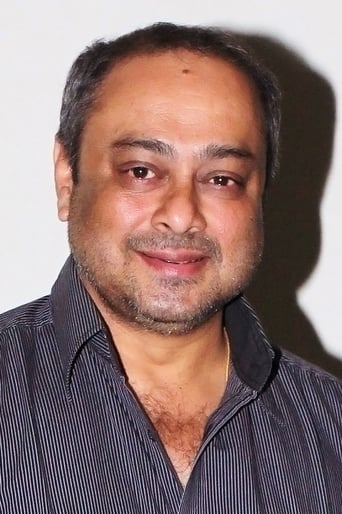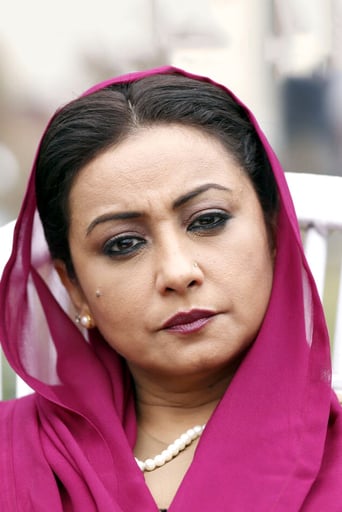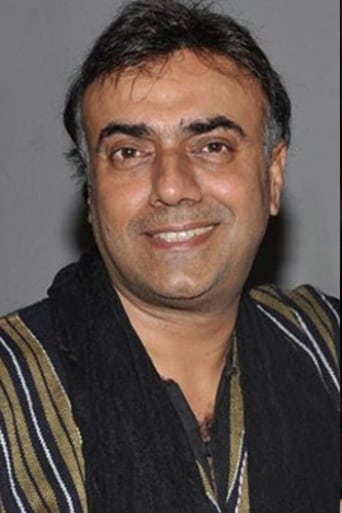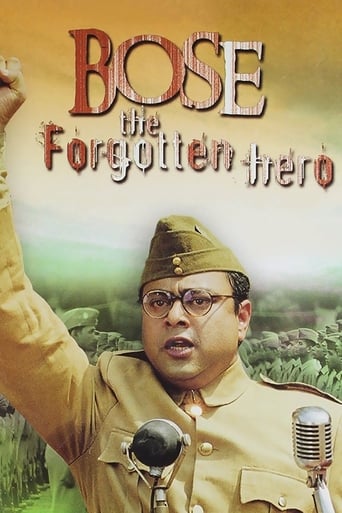
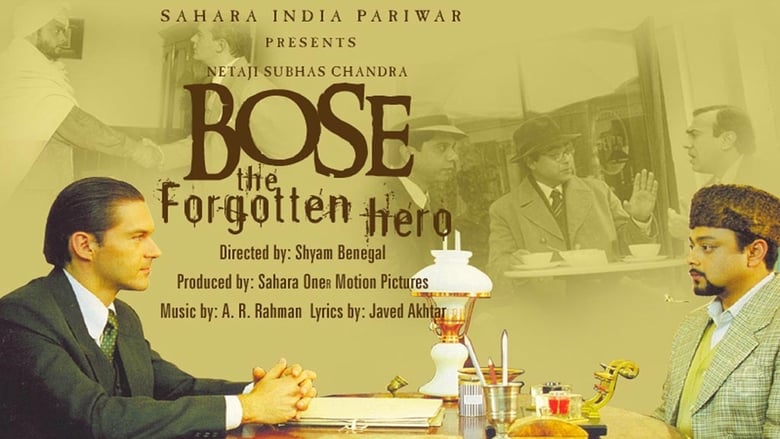
Netaji Subhas Chandra Bose: The Forgotten Hero (2005)
Netaji Subhas Chandra Bose: The Forgotten Hero (also known as Bose: The Forgotten Hero) is a 2005 film directed by Shyam Benegal and starring Sachin Khedekar, Kulbhushan Kharbanda, Rajit Kapur, Arif Zakaria, and Divya Dutta. The movie depicts the last five years of the life of the Indian independence leader "Netaji" Subhash Chandra Bose. It starts out at the point where Bose resigns from his position as the president of the Indian National Congress (I.N.C.) to the meeting with Italians by crossing Afghanistan's rugged terrains and entering into Europe, to romancing his German secretary and appointment with Adolf Hitler in Berlin, to his inspiring of the Indian P.O.W.s (Prisoners Of War) of the 'Punjab Regiment' (British Army) for fighting against the British forces in India, to the patriotic speeches.
Watch Trailer
Cast


Reviews
This is a film based on the life of Subhash Chandra Bose who does not find much mention in the history books. This film is a wonderful presentation of events with the mature acting of actors like Sachin Khadekar, Sonu Sood. Wonderful dialogues and fine presentation of events. This was realistic in approach and modern in outlook. Great work.
Directors are usually reluctant to translate history on celluloid. They are instead inclined to offer new interpretations of history, shed light on little-known facts about their subjects, and even raise questions that were missed. On the contrary, the title of Shyam Benegal's film- Netaji Subhash Chandra Bose – The Forgotten Hero- itself tells a story! Nobody remembers what he did, except to say that he was a great big hero. Few people remember that he challenged Gandhi, or that he was married.The film's narrative is brilliantly broken into three parts. These are headed under Itmad, Ittefaq and Qurbani after the motto of the Indian National Army. The film brilliantly captures the vast canvas of its history, geography and political ambiance just before India's independence from British rule. The film is the product of painstaking historical, documentary and other research that spanned 18 months. The research team explored all available material, interviewed the people alive such as Netaji's Japanese interpreter, then in his late eighties.The film comepletely lacks loud and bombastic rhetoric, a common feature of most nationalist and biographical films made on national heroes. Its central focus is on the man behind the hero, the human being behind the mask of the national leader, a true lover of his country dedicated to get it liberated from foreign rule. The film is characterised as much by the patriotism and hero-worship that brought young men in hundreds to join their hero, as by its documentation of history. It is the film of a journey- ideological, political, historical and personal that uncovers almost by incidence than by connivance of history, a beautiful fictionalized documentation of one of the greatest national heroes Indian has ever produced.
Yes, the movie fails on a number of cases- especially character development of Bose himself. It seems to me the whole thing was written and directed in haste. Further, some of the scenes were absolutely unnecessary (what is the need for a showing a German U-Boat firing a torpedo at a ship in this movie). Some of the war scenes were also very badly done. One expected a lot more from a director of Benegal's reputation. I thought the lead actor was very good but again fell short of expectations. But I would ask all Indians to watch the movie. BeThe movie wakes you up to the life and struggles of this hero. Before this I didn't know too much about the man.
I watched this film at its world premiere at the Harvard Film Archive yesterday night (Feb 11). I went to the movie with certain amount of expectation given the subject matter and the caliber of the director. However, I was bitterly disappointed and, moreover, embarrassed by this film about Bose. Bose is a little known personality in the history of Indian independence outside of India and his contribution has been overlooked inside India for 50 years primarily due to his differences with the Gandhi-Nehru axis. As a story, Bose's biography reads like a thriller and ultimately a tragedy, and hence make a great material for a film. Shyam Benegal has been one of the leaders of alternate (non-Bollywood) cinema in India for over two decades and has made some of the best and definitive (at least in my opinion) interpretation of Indian history and effect of historical episodes on common people in cinema. His television series based on Nehru's "Discovery of India" stands out as one of the best TV series made not only in India but through the world. "Making of Mahatma", his last attempt at biographical movie about an Indian leader was a very respectable movie even if it was hampered by low budget and had some excellent acting and, importantly, more depth and a fairer balance of personality of Mahtma Gandhi than Richard Attenborough's influential film. Thus, ignoring his dismal attempts at commercial movies recently, Benegal could be interpreted as a worthy descendant of the likes of Satyajit Ray, and one could bemoan his lack of exposure in the international market. "Bose: a Forgotten Hero" was seen by many of his admirers as a comeback for this worthy director to his field of expertise. I liked the way the movie started abruptly in 1940 at the moment of Bose's resignation as the president of the INC and the script's strategy of concentrating on the events of only the last 5 years of his life. Bose's rise and fall in the hierarchy of Congress Party would itself make an full-length political movie and hence was wisely discarded by the screenwriters. The story of his dramatic escape from India, under house-arrest by the British Government & under media glare, his earnest, if misguided, attempt at forming military alliance with the Italians/Germans/Russians/Japanses forces, and finally, his failed attempt at invading India in the last days of WW2 are brought to screen in astaggering 222 minutes. The movie is structured into three sectionsdealing with one each of the three plot lines mentioned above. Thescreenplay is more or less accurate in storyline. However, it has the ultimate flaw of historical movies, which tend to treat everybody, including Bose, like caricatures. Long screenplays trying to capture the life of a person can be excused for having some of these flaws. The problem with *this* movie is that, it seems completely unedited (note some of the scenes where the camera is not even in focus). I wonder if Benegal just finished shooting and clamped together every frame he shot without even an attempt at editing. Given what I saw on screen, this movie could have been salvaged by a crisper editing to make a more fast-paced movie. As it is, the film feels more suited to be a PBS mini-series than a feature length movie. If that was the only problem with the film, I could still live with it. However, it also had the added problem of shoddy acting on part of almost every single character. Sachin Khedekar, a television actor of TV soap operas was perhaps chosen for this role because of his resemblance to S.C. Bose. He did not put much effort into understanding his character and his acting was worthy of any day-time TV soap. Some supporting acting was good but mostly seemed to be cast of filler. All the international characters seemed like non-actors picked randomly from streets who were uncomfortable being on screen or were over-compensating for lack of talent by over-acting. The romance between Bose and his Greman secretary comes out without any credibility not just because of the lack of any screen intimacy between the characters (notice how the characters rarely even touched each other, leave alone kiss on screen. As the head of the censor board of India, Benegal is well known for his puritanical/conservative views on sex) but also because of really bad acting. Even the cleverest of editing would have not been able to mask this deficiency in the movie. Lastly, I must comment on the "bollywoodization" aspect of this movie. The movie has some of the worst and most embarrassing melodrama I have seen in ages. There were SO MANY moments through the movie where the audience were bursting out with unintended giggles because of the almost campy nature of dialogs. I would be the first one to confess that Indians are a melodramatic people in general and presence of melodrama in Indian movies, even historical, is an integral part. Melodrama *does* work in Bollywood movies in enhancing the emotional impact. In this movie, however, all it does is to cheapen the storyline and, furthermore, near the end of the movie, even feels insulting when the INA soldiers are shown in such inane melodramatic state. It adds nothing to the emotional impact and takes a lot away from the tragedy being played out on screen. I think the subject deserved more respect from the actors and the director than this. This movie is hard to digest for even the Indian audience who know the history of S.C.Bose and are used to Bollywood. I wonder what message it would give to international viewers about Indian films and about Bose. To do any justice to Bose, I seriously believe, this movie should not be shown in public. I will end the review with the advice not to see this movie unless you are studying film-making, in which case, this movie is great example of how a movie should NOT be made.


